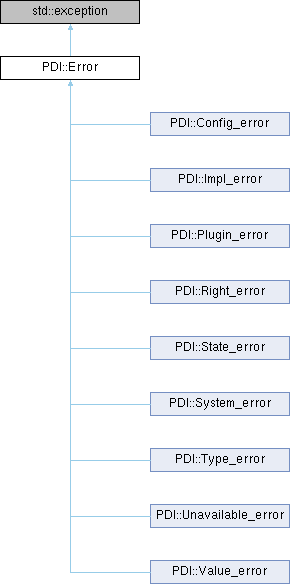◆ Error() [1/3]
Creates a PDI error without a message.
- Parameters
-
| [in] | errcode | the error code of the error to create |
◆ Error() [2/3]
template<typename S , typename... Args>
| PDI::Error::Error |
( |
PDI_status_t |
errcode, |
|
|
const S & |
format_str, |
|
|
Args &&... |
args |
|
) |
| |
|
inline |
Creates a PDI error.
- Parameters
-
| [in] | errcode | the error code of the error to create |
| [in] | format_str | an errror message as a python-style format |
| [in] | args | the python-style parameters for the message |
- See also
- printf
◆ Error() [3/3]
| PDI::Error::Error |
( |
PDI_status_t |
errcode, |
|
|
const char * |
message |
|
) |
| |
Creates a PDI error.
- Parameters
-
| [in] | errcode | the error code of the error to create |
| [in] | message | an errror message |
◆ what()
| const char * PDI::Error::what |
( |
| ) |
const |
|
overridenoexcept |
◆ status()
Returns status of the error.
- Returns
- status of the error
◆ m_status
◆ m_what
| std::string PDI::Error::m_what |
|
protected |
The documentation for this class was generated from the following file:
